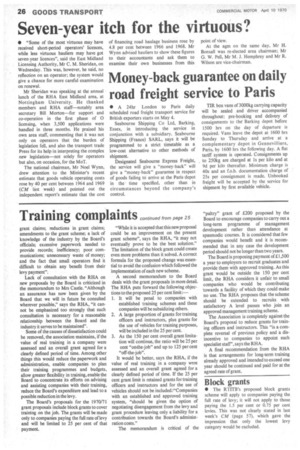Training complaints continued from page 25
Page 28

If you've noticed an error in this article please click here to report it so we can fix it.
grant claims; reductions in grant claims; amendments to the grant scheme; a lack of knowledge of the industry by the Board's officials; excessive paperwork needed to provide records; inefficiency; poor communications; unnecessary waste of money; and the fact that small operators find it difficult to obtain any benefit from their levy payment".
Lack of consultation with the RHA on new proposals by the Board is criticized in the memorandum to Mrs Castle. "Although an assurance has now been given by the Board that we will in future be consulted wherever possible," says the RHA, "it cannot be emphasized too strongly that such consultation is necessary for a reasonable relationship between the Board and the industry it serves to be maintained".
Some of the causes of dissatisfaction could be removed, the association maintains, if the value of real training in a company were assessed and an overall grant agreed for a clearly defined period of time. Among other things this would reduce the paperwork and administration, enable companies to plan their training programmes and budgets, allow greater flexibility in training, enable the Board to concentrate its efforts on advising and assisting companies with their training, reduce the Board's expenditure and lead to a possible reduction in the levy.
The Board's proposals for the 1970/71 grant proposals include block grants to cover training on the job. The grants will be made only to companies paying the full rate of levy and will be limited to 25 per cent of that payment. "While it is accepted thatthis new proposal could be an improvement on the present grant scheme", says the RHA, "it may not eventually prove to be the best solution." The limitation of the block grant could create even more problems than it solved. A correct formula for the proposed change was essential to avoid the confusion which followed the implementation of each new scheme.
A second memorandum to the Board deals with the grant proposals in more detail. The RHA puts forward the following objections to the proposed 25 per cent limit :— 1. It will be penal to companies with established training schemes and these companies will be subsidizing others.
2. A large proportion of grants for training officers and instructors, plus grants for the use of vehicles for training purposes, will be included in the 25 per cent.
3. As the 150 per cent overall grant limitation will continue, the ratio will be 25 per cent "on-the-job" and up to 125 per cent "off-the-job".
It would be better, says the RHA, if the value of real training in a company were assessed and an overall grant agreed for a clearly defined period of time. If the 25 per cent grant limit is retained grants for training officers and instructors and for the use of vehicles should not be included.'"Companies with an established and approved training system, "should be given the option of negotiating disengagement from the levy and grant procedure leaving only a liability for a contribution towards the Board's administration costs."
The memorandum is critical of the "paltry" grant of £200 proposed by the Board to encourage companies to carry out a long-term programme of management development rather than attendance at spasmodic courses. It is considered that few companies would benefit and it is recommended that in any case the development period should not be longer than two years.
The Board is proposing payment of i1,500 a year to employers to recruit graduates and provide them with approved training. As this grant would be outside the 150 per cent limit, the RHA considers it unfair to small companies who would be contributing towards a facility of which they could make no use. The RHA proposes that the scheme should be extended to recruits with satisfactory A level passes who join an approved management training scheme.
The Association is completely against the Board's proposal to reduce grants for training officers and instructors. This "is a complete reversal of previous policy and a disincentive to companies to appoint such specialist staff", says the RHA.
A final recommendation from the RHA is that arrangements for long-term training already approved and intended to exceed one year should be continued and paid for at the agreed rate of grant.
Block grants
• The RTITB's proposed block grants scheme will apply to companies paying the full rate of levy; it will not apply to those paying the 1.5 per cent or 0.75 per cent levies. This was not clearly stated in last week's CM (page 57), which gave the impression that only the lowest levy category would be excluded.
















































































































































































